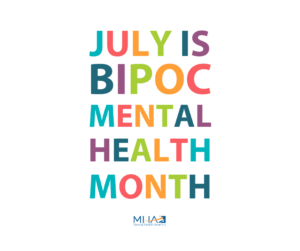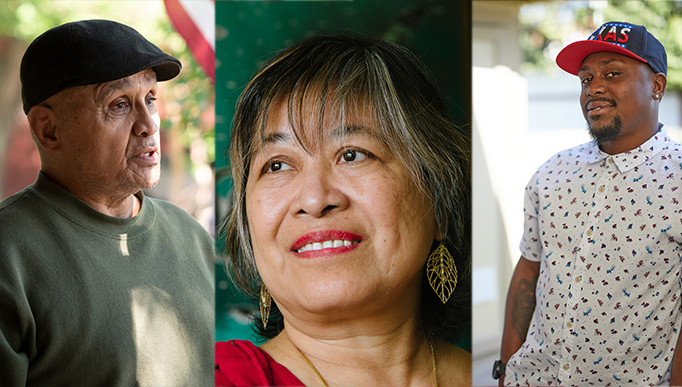TRANSPARENCIES
a monthly newsletter from Integral Care
a monthly newsletter from Integral Care
 July marks BIPOC Mental Health Month, a time to promote mental health among Black, indigenous, and all people of color. BIPOC communities experience mental health disparities caused by discrimination, unequal access to care, a lack of culturally and linguistically competent care, and additional stigma. I am proud to announce our Racial Equity Plan, informed by work with a national expert in the field of racial equity and cultural competency, and facilitated discussions among staff. Integral Care is committed to eradicating our own institutional racism and structural inequities.
July marks BIPOC Mental Health Month, a time to promote mental health among Black, indigenous, and all people of color. BIPOC communities experience mental health disparities caused by discrimination, unequal access to care, a lack of culturally and linguistically competent care, and additional stigma. I am proud to announce our Racial Equity Plan, informed by work with a national expert in the field of racial equity and cultural competency, and facilitated discussions among staff. Integral Care is committed to eradicating our own institutional racism and structural inequities.
Advancing racial equity will help ensure that BIPOC communities in Austin-Travis County have access to high-quality mental health services responsive to their needs.
The Racial Equity Plan identifies strategies and steps that must be incorporated in all efforts for Integral Care to be successful in advancing racial equity. We have already made significant progress since this time last year when our Board of Trustees appointed a Board/Staff Ad Hoc Committee on Racial Equity. Staff have engaged in multiple educational events and courageous conversations – including 2 virtual conferences aimed at expanding our diversity and inclusion practices, several book clubs and our Diversity & Inclusion Council’s series of 1-hour monthly sessions for staff to teach their co-workers about their culture and identity. We took a deeper look at several staff opportunities to celebrate diversity and improve ourselves and our approach to care in the February issue of Transparencies.
Integral Care will be inviting the community to engage in this work with us. Smith Research & Consulting LLC are performing a racial equity assessment of Integral Care. The consultants will use focus groups, interviews and survey results from a wide range of people to examine racial equity across our services, policies and procedures, environment, workforce and communications. Client access to services (including language access) as well as overall public perception of the agency will also be examined. They will reach out to community members this month to request participation.
Integral Care is committed to creating lasting change for this agency. It is critical that we deliver equitable, person-centered, culturally competent care to ensure that BIPOC communities have access to mental health services responsive to their needs.

David Evans
Chief Executive Officer
What Can You Do to Support BIPOC Mental Health?
Combat Stigma
BIPOC communities and cultures have different experiences and attitudes towards mental health. First and foremost, we can all work to destigmatize mental health across cultures. Here are some tips:
The more we understand other cultures and what makes each of us unique, the better we can reach out to anyone, regardless of culture and background.
 Share Local Mental Health Resources for BIPOC Individuals
Share Local Mental Health Resources for BIPOC Individuals
This list is by no means exhaustive. Myriad support services are available to BIPOC communities in Austin.
24/7 Helpline – Free emotional support in many languages
Integral Care | (512) 472-HELP (4357) – 24 hours a day, 7 days a week | Trained interpreters available
Mental health care, counseling, substance use disorder, and IDD services in many languages
Integral Care | (512) 472-HELP (4357) – Call for an appointment Mon – Fri, 8am – 5pm
For People of Color: healing justice social movement that provides mental health awareness
What’sintheMirror? – Comprehensive Austin Mental Wellness Database and healing through art
For Asian communities: access to emergency shelter, housing, safety planning, counseling and more
Asian Family Support Services of Austin | (877) 281-8371 – Toll-free 24 hours a day, 7 days a week | Services in various languages
For Black community and beyond: monthly virtual forums to support health and well-being
Together We Will Heal | Facebook group
For Muslim community: resources for low income people, refugees and victims of domestic violence
Muslim Community Support Services | 512-240-2257
For Asian community: healthcare navigation services, education and advocacy
Austin Asian Community Health Initiative | (512) 271-5823 – Services in 7 languages
More support groups offering culturally competent care
Let’s Talk About Mental Health….No Matter What Language You Speak
In honor of Bebe More Campbell National Minority Mental Health Awareness Month, we created a video series featuring our staff talking about mental health in different cultures. Mental health stigma is prevalent everywhere but unique perceptions and barriers to care exist based on history, culture and background. In the Black community, mistrust of the medical system and hesitation around taking medication is common because of the Tuskegee Study and other unethical medical experiments. In the Latinx community, there can be a lack of understanding about what mental health is or discomfort asking for help or sharing problems with strangers.
Visit Mental Health America for a wealth of information on the cultural factors and brand of stigma various communities face – Asian American/Pacific Islander, Native and Indigenous, Black, Latinx and multiracial people.
There are opportunities to educate and remove barriers to mental health care across all cultures, so everyone has the tools they need to build health and well-being. Check out our BIPOC Mental Health Month Youtube playlist. This week’s videos focus on Black and Latinx communities. Over the remainder of the month, keep an eye out for videos in Mandarin, Urdu, Arabic and Hindi.
We hope you enjoy our series.
Beauty Shop Talk: Post-Pandemic Anxiety
Join us July 21st for the latest virtual Together We Will Heal forum. Every month, the Central Texas African American Family Support Conference brings you a relaxed and engaging forum to support the health and well-being of our entire community. This month, motivational speaker and KAZI radio personality Kimberly Holiday (a.k.a. Lady Joy) will lead a discussion on post-pandemic anxiety. REGISTER today.
The pandemic has changed our lives and tested our resiliency in every way possible. As we begin to return to some normalcy, we are faced with yet another challenge: post-pandemic anxiety. Join the always lively Lady Joy in the virtual beauty shop to discuss ways to make our return to work, school and society easier.
June 2021: Facts & Resources This Pride Month
May 2021: Mental Health Month
April 2021: How do we help Austinites experiencing homelessness?
March 2021: Growth and Positive Change
February 2021: How Do We Create a Better Future?
January 2021: Looking Ahead to the Legislative Session
December 2020: Supporting Your Mental Health This Winter
November 2020: How do we rebuild health and well-being during a pandemic?
October 2020: With Collaboration Comes Innovation
September 2020: Success Stories of Recovery and Suicide Prevention
August 2020: A Back to School Season Like Never Before
July 2020: Minority Health Disparities & COVID-19
June 2020: Stronger Together
May 2020: Surviving and Thriving During Uncertain Times
April 2020: Persevering During COVID-19
March 2020: Collaborations and Initiatives to Improve Health for the IDD Population
February 2020:Solutions to Health and Health Care Disparities
January 2020: Sucicide Prevention a Local Effort
December 2019: A Year of Thriving Care & Collaboration
November 2019: Teamwork and Collaboration Impact Homelessness in Travis County
October 2019:Making Strides for World Mental Health
September 2019: Taking Steps to Recovery Support
August 2019: Working Together for Child & Youth Mental Health
July 2019: Legislative Wrap-Up – Some Bipartisan Wins for Healthcare
June 2019: Strengthening Access for Veterans and the Entire Military Family
May 2019: Women and Mental Health
April 2019: Legislative Session Status Report
March 2019: Making Opportunities for Recovery More Accessible
February 2019: Recovery is Possible
January 2019: Stronger Outcomes Through Collaboration
December 2018: Looking ahead to the 86th Texas Legislature
November 2018: How Tech is Changing the Face of Mental Health
October 2018: A Few Questions Could Help Save a Life
September 2018: Anyone Can Save a Life
August 2018: A Milestone Moment
July 2018: Equity in Mental Health Care for All
June 2018: Expanding Services for Veterans
May 2018: Your Mental Health Toolkit
April 2018: Time of Terror Calls for Increased Emotional Support
March 2018: Stopping the cycle of incarceration for individuals with mental illness
February 2018: Equity in mental healthcare for everyone
January 2018 : Improving Mental Health Through Partnership & Collaboration
December 2017: Strength Through Community
November 2017 : Healthy Lifestyles Improve Well-Being
October 2017 : National Child Health Day
September 2017 : Strengthening Families and Communities